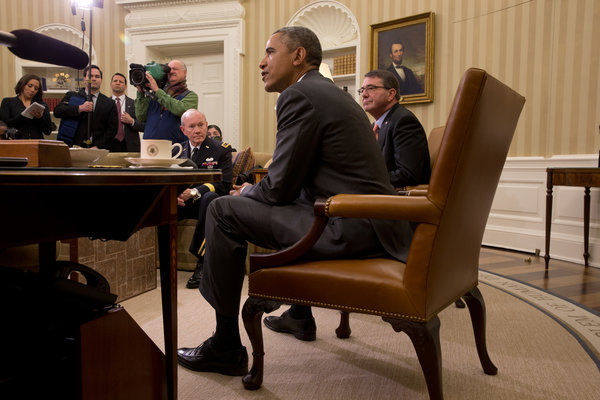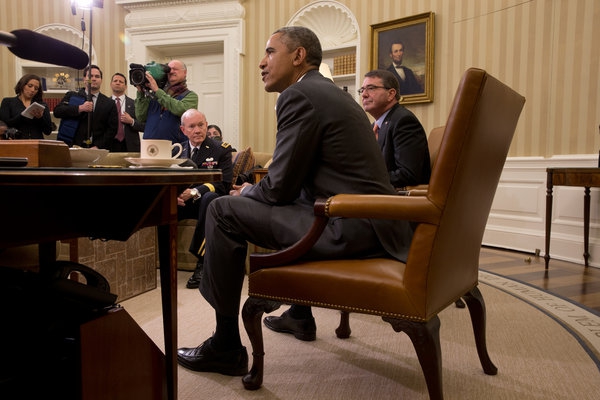 President Obama with Gen. Martin E. Dempsey, chairman of the Joint Chiefs of Staff, and Defense Secretary Ashton B. Carter. Credit Stephen Crowley/The New York Times[/caption]
President Obama with Gen. Martin E. Dempsey, chairman of the Joint Chiefs of Staff, and Defense Secretary Ashton B. Carter. Credit Stephen Crowley/The New York Times[/caption]WASHINGTON ��President Obama�s task of selling a potential nuclear agreement with�Iran�to a skeptical Congress became far harder on Tuesday after an�impassioned speech�by Prime Minister�Benjamin Netanyahu�ofIsrael�to lawmakers already nervous about the deal.
�The president has a very heavy burden of persuasion here,� said former Representative Lee H. Hamilton, a Democrat and the onetime chairman of the House Foreign Affairs Committee who now directs Indiana University�s Center on Congress. �That task is made much more difficult when a powerful case is stated against the emerging deal, as the prime minister has done.�
Although Mr. Hamilton said he doubted many minds were changed by Mr. Netanyahu�s words, he said that �what a speech like this does is reinforces and intensifies the opposition at a critical point.�
To be sure, others argued that Mr. Netanyahu�s address would have an effect opposite to the one he intended � prompting lawmakers undecided about the deal to chalk up Mr. Netanyahu�s message as raw politics and discount it.
�If anything, today�s speech pushed moderate Democrats into more of a wait-and-see approach, because it was such a rare event to see a sitting prime minister come over and take issue with a U.S. president on a matter of foreign policy importance,� said John Ullyot, managing director of the High Lantern Group and a former top Republican foreign policy aide in the Senate.
Mr. Netanyahu�s hotly disputed address constituted a remarkable moment in Washington: a foreign leader taking the podium before members of the House and Senate to argue strenuously against the policies of the sitting American president. In doing so, the Israeli leader was essentially urging lawmakers to trust him � not Mr. Obama � when it comes to preventing Iran from acquiring a nuclear weapon. Mr. Netanyahu�s address was the third he has given to a joint meeting of Congress. He also spoke in 1996 and 2011.
Visibly irritated by Tuesday�s speech when asked about it in the Oval Office afterward, Mr. Obama dismissed the pressure from his Israeli counterpart, pledging to take his case �to every member of Congress once we actually have a deal.�
But as he makes that crucial sales job � which will involve persuading lawmakers to go along with the easing of a complex set of sanctions against Iran, some put in place by Congress � Mr. Obama must now overcome not only the animosity of Republicans but also the words of the leader of Israel, whose powerful speech will serve as the counterpoint to a president they already distrust.
�It gives the far right on the Hill live ammo and firms up their view, especially in the House,� said Cliff Kupchan, chairman of the Eurasia Group consulting firm and an Iran specialist. �That�s going to make a hard sell a really hard sell for President Obama on a final deal.�
If nothing else, the speech accelerated the timetable for Congress to debate a forthcoming nuclear deal scarcely one month after Mr. Obama and his team succeeded in persuading restive Democrats to hold off temporarily on teaming with Republicans to push for new Iran sanctions. Ten Democrats signed a letter to Mr. Obama in January pledging not to vote for such a bill until after March 24, when negotiators from seven countries are aiming to reach a tentative agreement on stopping Iran�s�nuclear weapons�ambitions.
Warning of what he called the �countdown to a potential nuclear nightmare,� Mr. Netanyahu sought to use the fear that Iran would cheat on any deal, and ultimately escape constraints on its�nuclear programaltogether, to galvanize United States lawmakers from both parties against Mr. Obama�s position. He appealed to their commitments to Israel as a bulwark against their support for the American president.
Senator Mitch McConnell of Kentucky, the majority leader, moved quickly after Mr. Netanyahu�s address to put the president on notice that lawmakers intended to have their say in the matter.
�Congress and the American people need to be part of this discussion, too,� Mr. McConnell said as he moved to schedule debate on legislation that would make any Iran agreement subject to congressional approval. �Congress must be involved in reviewing and voting on an agreement reached between this White House and Iran.�
More than a dozen Senate Democrats, including Senator Robert Menendez of New Jersey, the ranking member of the Foreign Relations Committee, have indicated that they support legislation to impose more sanctions or to give Congress approval power over an eventual deal. That raises the prospect that opponents of an Iran agreement could cobble together a large enough bipartisan coalition to block it � and override a presidential veto if necessary.
Mr. McConnell�s move on Tuesday cleared the way for a procedural vote as soon as Monday on the congressional review bill, which Mr. Menendez has co-sponsored.
But Mr. Menenedez objected angrily on Tuesday to speeding up the timetable for the Iran debate, saying he would oppose taking up his own bill if Republicans insisted on doing so before March 24. �There�s no reason � no reason � to accelerate this process in this way,� he said on the Senate floor.
In the longer term, Mark Dubowitz, the executive director of the Foundation for Defense of Democracies, which has been pushing for a harder line on Iran, said that Mr. Netanyahu might have persuaded �a good number of moderate Democrats that Congress should at the very least have a say� on any deal.
For Democrats who have long viewed themselves as supporters of Israel, Mr. Netanyahu�s speech sought to impress upon them the likelihood that they will eventually need to make an awkward, painful choice between the president of their country and their loyalty to the Jewish state.
It would be up to Democrats in Congress to make sure that lawmakers do not override Mr. Obama�s veto, a rebuke that would embarrass the president at home and overseas. That task would fall in part to Representative Nancy Pelosi of California, the minority leader in the House, who issued a blistering condemnation of Mr. Netanyahu�s address, calling it an �insult.�
Some Democrats who are strong supporters of Israel praised Mr. Netanyahu�s speech.
�Many members of Congress are still hoping to give the president the benefit of the doubt,� said Representative Eliot L. Engel of New York, the top Democrat on the Foreign Affairs Committee. �I certainly think that the prime minister raised some valid points. The question to me is: Are we safer because of the deal? Do we prevent Iran from having a nuclear weapon because of the deal, or is there a better alternative?� He added: �You can�t really know until you see what�s in the deal.�
By The New York Times











